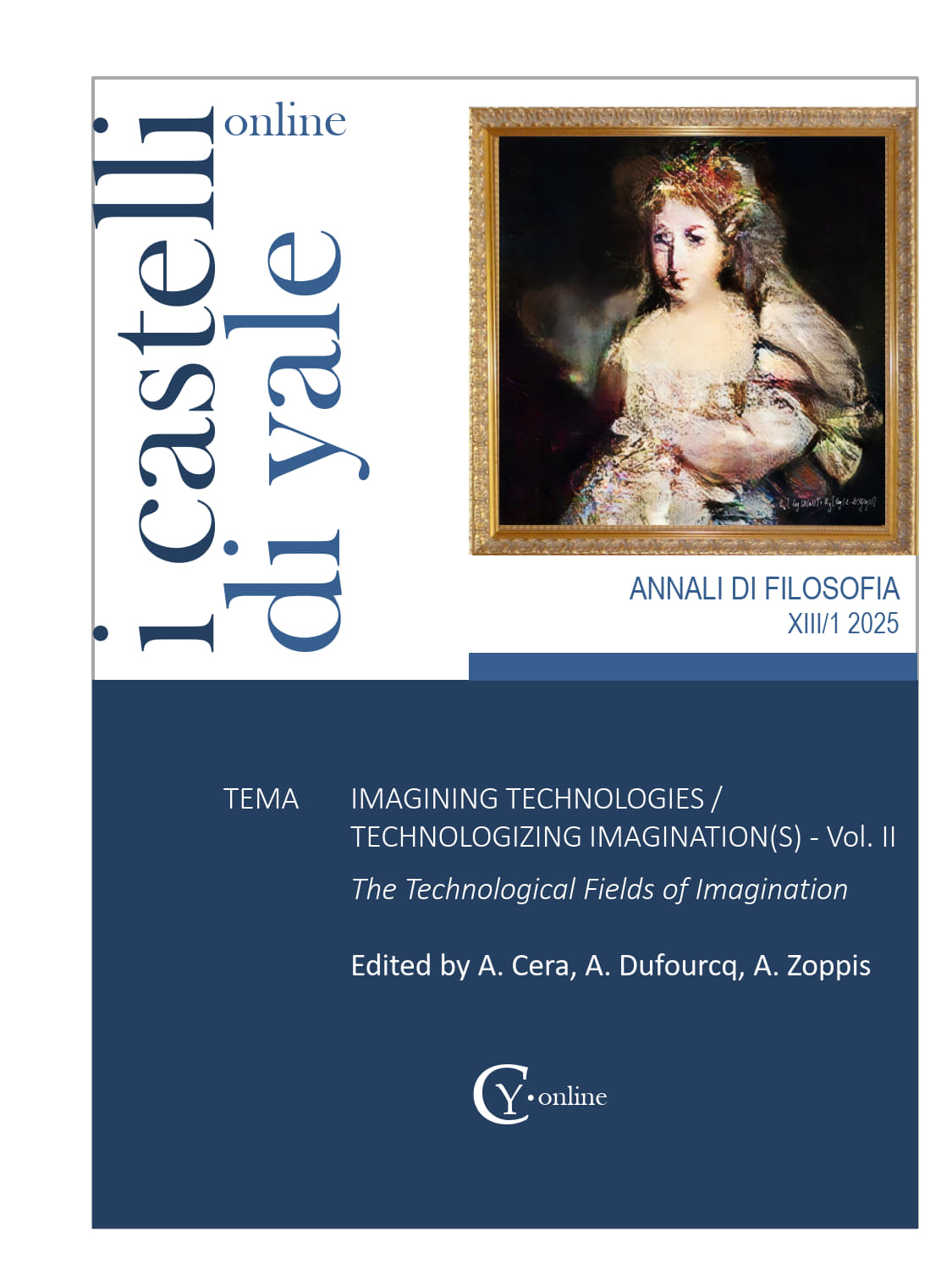The Imagination as a Mode of Technological Being
DOI:
https://doi.org/10.15160/2282-5460/2869Keywords:
Imagination, Philosophy of Technology, Ontology, Simondon, DeleuzeAbstract
This text explores an ontological question within the broader reflection on technology and imagination. Our central inquiry is how imagination can emerge within the predictable and calculable techno-technological sphere rather than examining specific interactions between the two. Given our historical context, both civilizational and technological, this question needs to be distinguished between “technique” and “technology”. While this distinction has been addressed epistemologically, economically, and politically, we focus on its ontological implications. In this sense, we define “technology” as the phenomenological manifestation of technological events, whereas “technique” represents a deeper semantic system shaping our era’s understanding of reality. Consequently, we engage only with technology as a tangible field, while technique remains an overarching mode of being. It is within the technological sphere that imagination finds its real possibility, but its conceptualization belongs to the register of technique. Thus, imagination is produced in technology and can be thought through technique. The ontological conditions enabling imagination within the techno-technological sphere emerge from the tension between Heidegger’s and Simondon-Deleuze’s perspectives on technology. Heidegger sees technique as fundamentally tied to calculable production, foreclosing other modes of world-disclosure, with any “salvation” lying outside technique — perhaps in the poetic. In contrast, Simondon and Deleuze acknowledge the technique’s calculability but emphasize its instability and excess, which allow for unpredictable, imaginative emergence. This duality – technology’s calculable, deterministic nature versus its unpredictable excess – opens space for imagination. The ghost in the machine, the unintended uses of technology, and the unpredictable aspects of the technical world, all contribute to how we “imagine” technology itself. Thus, while technology enforces predictability, its ontological excess enables imagination, shaping our technical understanding of the world.
References
Borgmann, A. (1984). Technology and the Character of Contemporary Life: A Philosophical Inquiry. Chicago: University of Chicago Press.
Bunge, M. (1985). Treatise on Basic Philosophy, vol. 7: Philosophy of Science and Technology. Reidel Publishing.
Carvalho, H. B. A. (2020) A pós-fenomenologia: relações humano-tecnologia. Caxias do Sul: EDUCS.
Deleuze, G. (1994). Difference and Repetition. Engl. Trans. P. Patton. New York: Columbia University Press.
Deleuze, G. (1991). Empiricism and Subjectivity: An Essay on Hume’s Theory of Human Nature. Engl. Trans. C. V. Boundas. New York: Columbia University Press.
Deleuze, G. (1990). The Logic of Sense. Engl. Trans. M. Lester & Ch. Stivale. New York: Columbia University Press.
Deleuze, G., Guattari, F. (1994). What is philosophy? Engl. Trans. H. Tomlinson, G. Burchell. London / New York: Verso.
Deleuze, G., Guattari, F. (1987). A Thousand Plateaus: Capitalism and Schizophrenia. Engl. Trans. B. Massumi. Minneapolis / London: University of Minnesota Press.
Demina, A. I. (2020). The Category of Imagination in the Theory of Activity and Philosophy of Technology. Contemporary Philosophical Research, (3), 77–84. (https://doi.org/10.18384/2310-7227-2020-3-77-84).
Heidegger, M. (1977). The Question Concerning Technology. In The Question Concerning Technology and Other Essays. Engl. Trans. W. Lovitt (3-35). New York: Harper & Row.
Ihde, D. (1990). Technology and the Lifeworld: From Garden to Earth. Bloomington/Indianapolis: Indiana University Press.
Montani, P. (2020). The Imagination and Its Technological Destiny. Open Philosophy, 3(1), 187-201 (https://doi.org/10.1515/opphil-2020-0107).
Mumford, L. (1934). Technics and Civilization. New York: Harcourt, Brace & Company.
Ricoeur, P. (1977). The Rule of Metaphor: Multi-disciplinary Studies of the Creation of Meaning in Language. Engl. Trans. R. Czerny. Toronto: University of Toronto Press.
Ricoeur, P. (2024). Lectures on Imagination. Ed. by G. H. Taylor et alii. Chicago: University of Chicago Press.
Simondon, G. (2020). On the Mode of Existence of Technical Objects. Engl. Trans. C. Malaspina & J. Rogove. Minneapolis: University of Minnesota Press.
Virilio, P. (2007). Speed and Politics: An Essay on Dromology. Engl. Trans. M. Polizzotti, Trad.). Los Angeles: Semiotext(e).
Wellner, G., Dierckxsens G., Arienti M. (eds) (2024). The Philosophy of Imagination: Technology, Art, and Ethics. London: Bloomsbury.
Downloads
Published
Issue
Section
License
Copyright (c) 2025 Eladio Costantino Pablo Craia

This work is licensed under a Creative Commons Attribution-NonCommercial-NoDerivatives 4.0 International License.


